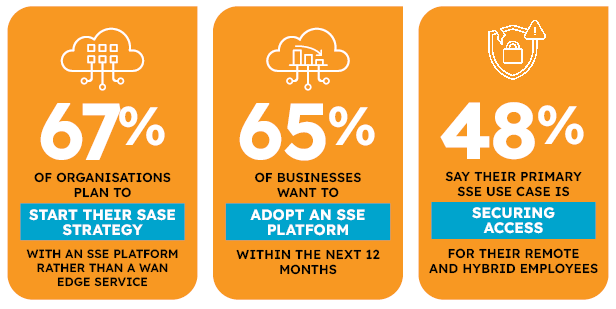
As technology rapidly evolves, businesses must not only adapt and harness new solutions to remain competitive, but the responsibility also now falls on the business owners to show risk mitigation. Switching to more advanced frameworks like Aruba SASE can seem daunting, but let’s explore these hesitations and some insights below:
1. Resistance to Change: The VPN Tradition
The most common response we hear when talking about adopting new technology is, “We’ve always done it this way,” referring to traditional VPN connections on laptops. While this solution may be familiar, VPNs often grant broad and unrestricted network access, unknowingly increasing your risk. For example, when third-party contractors connect to your system from a potentially compromised device, they could unintentionally create a backdoor into your internal networks which may be used in the future for malicious activity.
- Unlike traditional VPNs, SASE (Secure Access Service Edge) enables you to tightly control access to specific network resources. It integrates trusted cloud identities and two-factor authentication (2FA), bolstering your security posture. With SASE, you don’t need expensive managed WAN services; a stable internet connection will do, significantly reducing costs and the external attack surfaces.
2. Reliance on Legacy Applications
Many businesses rely on legacy applications central to their operations for years, if not decades. The problem is as cybercriminals become more advanced, hacking your legacy software becomes an easy target. Older technology is more likely to have unpatched vulnerabilities that hackers know how to exploit, making it easy for them to bypass security measures. Legacy applications often lack modern security features like encryption, multi-factor authentication, or regular security updates, giving hackers an easy path to sensitive data.
- Transitioning to SASE can reduce the risk by removing the need for legacy MPLS WAN solutions. This not only cuts long-term costs but also shields older, on-premises applications (like unpatched email servers) from cyberattacks, particularly through old unmaintained software. SASE also uses Zero Trust Network Access (ZTNA) principles to ensure that each user, device, and application is authenticated and authorised before gaining network access. This limits potential damage in the event of a security breach. By centralising access policies and applying them consistently, it prevents unauthorised users from accessing and exploiting legacy applications. and provides a robust defence layer for your critical business operations.
3. Skills Shortages and Knowledge Gaps
A significant barrier to technology adoption is the lack of specialised skills and knowledge within in-house IT teams. Often, these teams are made up of generalists by necessity, particularly in small to medium-sized businesses where they may ‘wear many hats’. As a result, they may not have the expertise to design, implement, or manage a solution like the SASE framework. Much like the initial shift to cloud email services a decade ago, moving to new technology may feel like a leap into the unknown, making businesses hesitant to adopt this advanced security solution.
- By partnering with a leading industry expert, businesses can tap into advanced, managed network security services tailored to specific needs. This allows in-house IT staff to focus on their core responsibilities without the constant pressure to upskill in new, specialised fields. SASE ensures that network security is handled by experts who follow best practices and maintain a robust, secure infrastructure. This empowers businesses to reap the benefits without worrying about the cost and time it takes to upskill existing IT team members or hire a full-time employee with this type of specialist knowledge.
Embracing Change: Lessons from the Past
Just as businesses eventually embraced cloud technologies like Office 365, adopting SASE represents a forward-thinking shift that aligns with modern business practices. It’s important to not just react to technological advancements but to proactively integrate them into your business framework. This strategic approach ensures enhanced security, improved efficiency, and a competitive edge in today’s digital landscape.

At Lexel Systems, we understand the challenges business owners and their IT Managers face in navigating these changes. We are here to support your transition to a safer, more secure network infrastructure through our network of trusted business partners. Embrace the change and move your business towards a future-proof IT environment.
Reach out to have a chat about what this journey could look like for your business.
 Author:
Author:
Nick Perry, Team Lead – Network and Security
With over 20 years of experience in the IT industry, Nick is a consultant at Lexel specialising in Aruba, with a focus on design and implementation across various industries.
